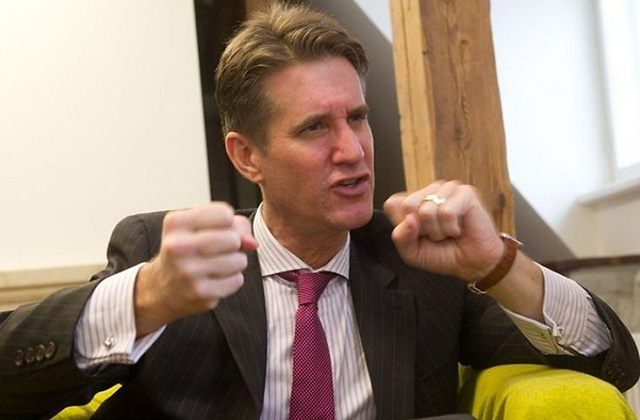Aliyev and Sargsyan are much closer to Karabakh settlement, than Putin and Assad in Syrian conflict: Matthew Bryza

Interview with former United States Ambassador to Azerbaijan, American diplomat Matthew Bryza.
Mr. Bryza, U.S. Secretary of Ssytate Kerry raised a diplomatic tumult around the South Caucasus unsettled NK conflict, stating that presidents of Armenia and Azerbaijan aren’t ready to settle the conflict and there is no background for the settlement. Observation by Azerbaijani president Aliyev was also noteworthy that behind the closed doors they’re forced to recognize NK independence, and this, pursuant his remarks, is implemented by the Western side. On account of these statements, what’s going on in the settlement process?
I’m not an official any more, thus I don’t have internal information and I can’t say what the sides have been proposed and what Azerbaijani president Aliyev means, touching upon pressures. So, I can’t give reliable comment on the situation. What I can say is the following: it would be better and proper, if Secretary Kerry centralized his attention and activity on exact proposals, how to push forward OSCE MG negotiations. This would be more productive, rather than saying that the presidents aren’t ready for the agreement. As he allocated rather long time on Syrian conflict settlement and he knows that it’s Bashar Assad and Vladimir Putin, who aren’t ready for diplomatic settlement of the Syrian conflict.
So why does he complain of Armenian and Azerbaijani presidents, claiming that they’re not ready for the settlement, if he can state that he can do everything to create a common ground for the settlement, as obviously Armenian and Azerbaijani leaders are much closer to NK conflict political settlement, than Governments of Syria and Russia in Syrian conflict.
What do you mean by touching upon the steps of the U.S.? Maybe exertion of NK’s independence recognition is in the context of those steps, which Aliyev has touched upon.
I don’t know which proposals may be available today, and what Aliyev has been proposed. I haven’t talked to anyone in Washington about it. However, significantly, president Aliyev raised that anxiety. I wasn’t aware which concrete proposals Putin made on this point in the former period. Thus, it’s difficult to say anything, what president Putin proposed in the past and the U.S. proposed recently. I can suppose that it’s a speculation. I may assume that Ambassador Warlick forced the sides to finalize the agreement around Madrid Principles and Putin’s proposal on June 20, which includes bilateral concessions.
On account of the abovementioned statement by Aliyev and that of Armenian Deputy FM Kocharyan that Madrid Principles should be reviewed, how can the mediators activate negotiations, which seems to appear at a deadlock as a result of new conditions set forward by the sides?
You know that the mediators are trying. They try to agree on a new presidential meeting. This is for their activities. As for the content, then president Putin surprised with his constructiveness in June. It seems to me, that it inspires hope, however, it also seems to me that some people in Armenia were against those proposals by Putin. So I think MG Co-Chairs should do brainstorming not only to one another, but Putin, then Armenian and Azerbaijani presidents, clarifying why those proposals have disappeared and at which stage they are. At the same time, maybe it would be reasonable that the Co-Chairs focused on developing means of trust, so that citizens of Armenia and Azerbaijan didn’t consider one another as external enemies. Many steps can be initiated to that end.
Mr. Bryza how will deepening USA-Russia confrontation in Syria be reflected on their moods and postures in NK conflict settlement?
I consider this shouldn’t be reflected in any way. My experience hints me that even at the stage of attacking Georgia, no matter the USA was against Russia’s policy against Georgia, we were striving to work together within the MG. in that period I was a Co-Chair and was working with the Ambassador and Lavrov with great efficiency. Thus, I may say, that they’ll strive to work well, and I would say in that period we worked productively, and it seems to me that it’ll occur today too.
USA-Russia relations today are at their lowest level, that I can ever remember. People accuse Russia of war crime in Syria, and it’s stated by the USA, France, even UNO Secretary General says it, as Russia in Syria created a serious negative situation. Hopefully it won’t have its implications on MG work, like before.
Opinions are being circulated that Russia will attempt to “revenge” for the policy pursued by the U.S. in Syria on Karabakh conflict zone, or by tension on this zone will calm down posture of the U.S. towards Russia in Syria. What do you think, how will Syrian conflict be mirrored in the situation on the contact line?
Of course, I don’t imagine how it may practically happen. If Russia decides to increase tension on the contact line, this, of course, will damage Armenia and Azerbaijan, but it’ll damage Russia as well, as the latter doesn’t intend to observe wide-scale military operations in Karabakh either, as from the perspective of direct threat it is more dangerous for Russia, rather than for the U.S. I don’t see any logic, that Russia acted against the posture of the U.S. on Russia’s activities, war crime, revenging from the U.S. in Karabakh. I’ll exclude this. Russia may have another reason to do that, I don’t know, which reason, but it’ll have negative implications for itself as well.
Mr. Bryza, how will ongoing political developments in the conflicting countries, accompanied by tension of political life, be reflected in negotiations?
When there are internal political developments, tension, then for a leader of any country, the complicated issue of going to a compromise becomes even more complicated. The higher political tension is, the more difficult the settlement process will be.
By Araks Martirosyan

























